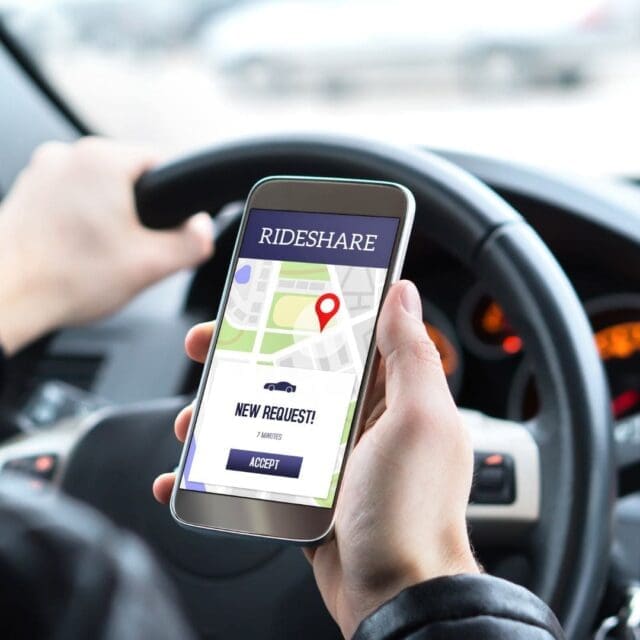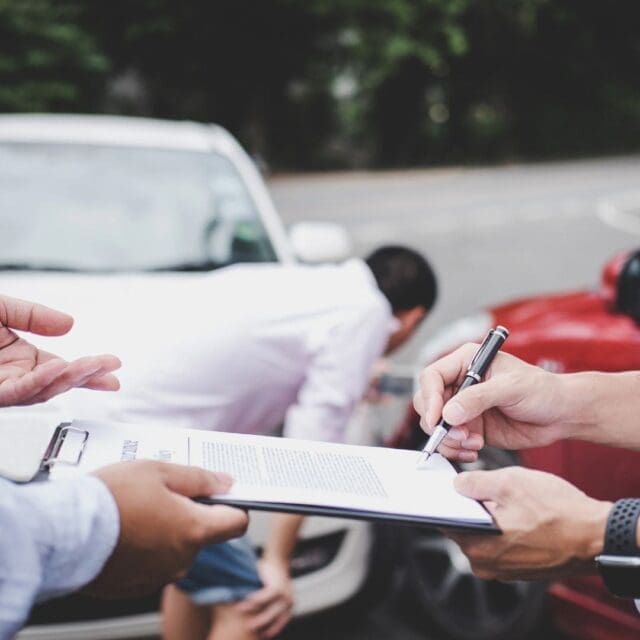While you may believe that accidents in rideshares are rare and mostly inconsequential, it’s pivotal to understand your rights and the potential for serious legal redress when rideshare driver negligence is involved. As a rideshare passenger, you’re entitled to a standard of care that, if not met due to driver negligence—be it from distraction, fatigue, or otherwise—opens pathways for compensation. Sorting through the complex interplay between personal injury claims and insurance policies can be formidable, but you’re not alone. What if you found out that tackling these challenges could be more straightforward than you think? What steps should you consider next to ensure your rights are fully protected?
Understanding Rideshare Negligence

Many rideshare passengers aren’t aware that rideshare driver negligence can considerably impact their safety and legal rights. When you enter a rideshare vehicle, you entrust your well-being to the driver and the company behind the app. This trust isn’t merely a convenience but a legal agreement wherein the driver is supposed to ensure a safe journey compliant with traffic laws and company policies.
Your rights as a passenger extend beyond mere transportation. They encompass a safe environment free from reckless or negligent behavior by the driver. Should this trust be breached through rideshare driver negligence, you’re not just at risk of physical harm; your ability to seek redress is also affected.
The legal landscape surrounding rideshare incidents can be complex. You’re dealing not only with the driver but often a large corporation with extensive legal resources.
Understanding this dynamic is critical. Recognizing the signs of rideshare driver negligence and knowing your rights can empower you to take swift action should it be necessary. It’s not just about reacting to an incident but proactively understanding the potential legal avenues that can protect you. This knowledge isn’t just power—it’s an essential shield in guarding your safety and rights in the evolving landscape of rideshare services.
Causes of Rideshare Accidents
Understanding the varied causes of rideshare accidents is essential to addressing ongoing risks and enhancing passenger safety. These causes often intertwine with human error and systemic issues within the rideshare industry’s fabric.
Firstly, driver distraction stands as a dominant factor. Whether traversing busy city streets, responding to app notifications, or managing passenger interactions, these distractions can compromise a driver’s focus and reaction time. As you navigate through your busy schedule, remember that your driver faces their own set of distractions that could impact safety.
Fatigue also plays a critical role. Fatigue can lead to slower reaction times and impaired decision-making. It’s a stark reminder that behind that wheel is a human being prone to the same weariness you feel after a long day.
The pressure to maintain high ratings and secure more rides can also prompt drivers to take unnecessary risks, from speeding to ignoring traffic signs. You mustn’t overlook how these pressures can subtly yet substantially raise the risk of accidents. Being aware of these factors allows you to be more proactive about your safety during your rides.
Passenger Rights Explained
You should be aware of your rights as a ride-sharing vehicle passenger, which can substantially influence the outcome should an incident occur. You’re entitled to a reasonable standard of care from your driver. This means the driver must operate the vehicle safely and adhere to traffic laws to prevent foreseeable harm. If a driver is reckless or negligent, you’re a victim and a pivotal witness in legal proceedings against the driver and possibly the rideshare company.
As a rideshare passenger, you have the right to be transported in a vehicle that’s in safe operating condition. Rideshare companies must confirm their drivers’ vehicles meet safety standards and that regular maintenance is performed. Failing to do so can be seen as rideshare driver negligence.
Know that your rights as a passenger extend to receiving clear and accurate information about your ride, including the driver’s identity and the fare calculation. Any ambiguity or misinformation can be used against the rideshare service provider in a dispute.
Understanding these rights puts you in a much stronger position should you ever need to seek compensation or report misconduct. Asserting your rights promptly and confidently can make all the difference in resolving any issues during your commute.
Insurance Coverage Details

While rideshare companies like Uber and Lyft offer substantial insurance coverage, understanding the details is vital in ensuring adequate protection in accident situations. These firms provide a minimum of $1 million in liability insurance for personal injury, property damage, and wrongful death whenever a passenger is in the vehicle. Additionally, they offer an additional $1 million in uninsured/underinsured motorist coverage to safeguard you if the at-fault driver is inadequately insured (Always check your rideshare company’s terms and conditions to view their latest liability limits and information).
However, the coverage intricacies vary depending on the driver’s status. For instance, coverage amounts may differ when the driver is logged into the app but hasn’t yet picked up a passenger. Knowing these distinctions is indispensable because it influences how you navigate through potential claims.
You will likely face a complex, layered process that often necessitates legal expertise. Typically, you might have to deal with claims against the driver’s insurance, the rideshare company’s policy, or both–depending on when and how the accident occurred. Engaging an experienced personal injury attorney familiar with ridesharing cases can help demystify these complexities, ensuring that you don’t just navigate the system but do so with an advocate by your side to maximize your rightful claim.
Steps Following an Accident
Immediately following an accident, assess your safety and health, then document the scene if possible. You’ll need to act quickly and cautiously, putting your well-being first while capturing essential details. Remember, your decisions can significantly influence any legal actions you might consider later.
Call emergency services: Safety must be your top priority. If you have injuries, it’s indispensable to get medical help immediately.
Notify the police: A formal police report solidifies the accident’s facts and can be essential for legal proceedings.
Exchange information: Collect names, contact details, insurance information, and relevant data from all parties involved, including witnesses.
Take photographs: Capture clear images of the accident scene, vehicle damages, and any visible injuries. These can offer indisputable evidence for your case.
Report the accident to the rideshare company. Most companies have protocols for accidents involving their drivers, and your prompt report helps ensure these protocols are followed properly.
Determining Fault and Liability
Determining who is at fault in a rideshare accident involves thoroughly analyzing driver behavior, vehicle conditions, and adherence to traffic laws. You must examine whether the rideshare driver was distracted, driving recklessly, or failing to comply with road safety regulations. It’s indispensable to assess your driver’s actions and those of other drivers involved in the incident.
Evidence plays a pivotal role in these scenarios. You’ll want to gather everything from dashcam footage to witness statements and police reports. Remember, the burden of proof rests on showing that the driver’s actions or inactions directly led to the accident. These violations can support your rideshare driver negligence claim if your driver ran a red light or was speeding.
But it’s not just about what happened during the incident. You must also consider the broader context. Was the rideshare company responsible for ensuring the vehicle was in good working condition? Did they perform adequate background checks on their drivers? These details matter because if a company’s lack of proper oversight contributed to the accident, it might also be liable.
Understanding these nuances and gathering the right evidence will help you establish fault and pursue accountability effectively.
Filing an Insurance Claim

If you’re injured in a rideshare accident, filing an insurance claim to secure compensation for your damages is vital. It knows the correct insurance policy to file against, whether the driver’s insurance or the rideshare company’s, depending on the driver’s status at the accident time. This decision is crucial because rideshare companies’ insurance can have significant coverage gaps.
Navigating this complex process usually requires the insight of an experienced person to show why hiring a personal injury attorney is essential and indispensable:
- Expertise in Insurance Laws: An attorney knows the intricacies of state laws and how they influence insurance claims.
- Dealing with Insurance Companies: Attorneys are skilled in negotiating with insurance adjusters to maximize your settlement.
Without proper legal guidance, significant hurdles can hinder your recovery of full damages. Engaging an attorney early helps address these challenges head-on, ensuring you aren’t vulnerable in a complex legal environment.
- Timely Filing: They ensure your claim is filed within legal time limits, preventing any forfeiting rights to compensation.
- Documentation: A legal expert will help gather and organize the necessary paperwork and evidence to support your claim.
- Maximizing Compensation: An experienced lawyer will evaluate all damages, helping you claim a comprehensive, extensive settlement.
Pursuing a Personal Injury Lawsuit
While filing an insurance claim is often the initial step, pursuing a personal injury lawsuit can offer additional avenues for compensation when the responsible parties fail to provide adequate restitution. If you’ve been injured due to rideshare driver negligence, this legal route might be your best path to guarantee you’re fully compensated for your losses.
A lawsuit transcends mere reimbursement for medical expenses and car repairs; it digs deep into your long-term needs. You might be facing prolonged medical treatment, loss of wages, and emotional distress—all critical factors a courtroom considers. Furthermore, punitive damages may be in play if the driver’s actions were reckless, designed to deter future rideshare driver negligence.
You’ll need to meticulously document your injuries and collect as much evidence as possible—medical records, witness statements, and documentation of lost wages are all pivotal. Remember, you’re building a case for what you’ve lost and the impacts on your future quality of life.
Pursuing a lawsuit won’t erase the trauma but can profoundly alter your financial recovery trajectory. Think of it as a strategic move to secure what you rightfully deserve when other routes have fallen short. Don’t hesitate to assert your rights and push for the compensation that mirrors your hardships.
Role of Personal Injury Attorneys
Personal injury attorneys are crucial in navigating the intricate legal environment of rideshare accident claims to guarantee you receive the compensation you deserve. They’re not just lawyers but advocates who stand by your side through the complexities such cases inevitably bring. These legal professionals immerse themselves deeply into the nuanced laws and insurance labyrinth that often defines rideshare incidents, capitalizing on their expertise to advocate effectively on your behalf.
They’re equipped with specialized knowledge that enables them to decipher the oft-misunderstood policies and procedures of insurance companies and rideshare platforms. With this arsenal of legal know-how, personal injury attorneys ensure your case isn’t just heard but respected and treated with the seriousness it warrants.
Expert Traversal of Laws: Mastery of state and federal laws impacting rideshare cases.
Insurance Liaison: Skilled in dealing with insurance adjusters to secure rightful settlements.
Maximized Compensation: Focused on recovering full damages, from medical bills to lost wages.
Strategic Negotiation: Experienced in negotiating settlements that favor your interests.
Holistic Case Management: They manage all aspects of your case, letting you focus on healing.
Hiring a personal injury lawyer means transitioning from a victim to a victor, ensuring you aren’t just a statistic in the growing annals of rideshare accidents.
Contacting Legal Representation
After suffering an injury as a rideshare passenger, you should consult a personal injury attorney specializing in such cases to safeguard your legal rights and explore your compensation options. Engaging a specialized lawyer early can significantly influence the outcome of your claim.
These attorneys have the expertise to dissect complex insurance policies and pinpoint who’s legally at fault—the driver, the rideshare company, or another entity. An experienced attorney’s role extends beyond simple consultations; they collect essential evidence supporting your case.
This evidence includes driver history, vehicle safety records, and eyewitness accounts, which are often pivotal in proving rideshare driver negligence. They understand the nuances of rideshare laws and will ensure you don’t overlook any legal avenues for recovery.
Keep in mind the urgency of legal timelines. Filing your claims within the statutes of limitations is paramount to secure your rights. Personal injury law firms typically offer a free initial consultation that will assist you in understanding these timelines and the strength of your case without financial commitment. Their no upfront cost structure means they’re compensated only if you win, aligning their success directly with your best outcome.

How Calandro Law Can Help With Rideshare Driver Negligence Case
Maneuvering rideshare driver negligence is like untangling a complex web—daunting yet vital. Remember, managing this maze alone can overshadow your rights. Equip yourself with a skilled attorney who can illuminate obscure details and carve a pathway through the insurance and legal labyrinth.
This is where Calandro Law steps in. As a leading personal injury attorney serving Riverview, Tampa, Ruskin, and throughout Hillsborough County, Calandro Law specializes in helping victims of car accidents, including those involving rideshare services, receive the maximum compensation for their injuries. Their experienced attorneys understand the nuances of rideshare laws and will ensure you recognize all legal avenues for recovery.
Calandro Law’s commitment to its clients extends beyond simple consultations. They work tirelessly to collect essential evidence supporting your case, from driver history and vehicle safety records to eyewitness accounts, often pivotal in proving rideshare driver negligence. Their no upfront cost structure means they’re compensated only if you win, aligning their success directly with your best outcome.
Remember, it’s not just about managing a claim; it’s about asserting your right to safety and justice. Don’t stand back—step forward and reclaim your peace of mind with Calandro Law. Contact us today to explore your legal options and take the first step toward securing the compensation you deserve.



